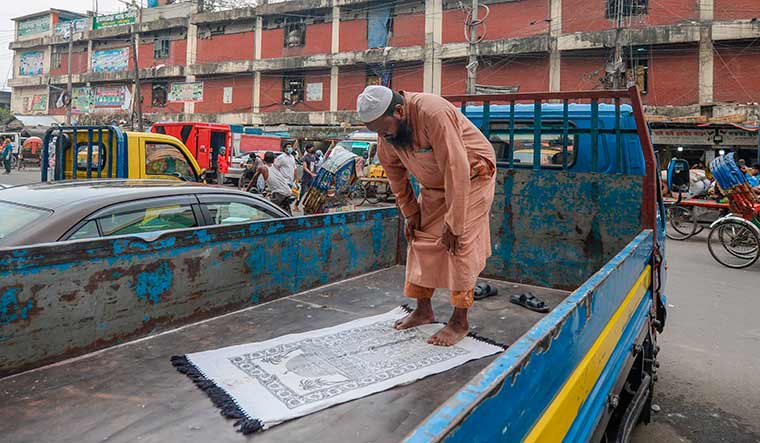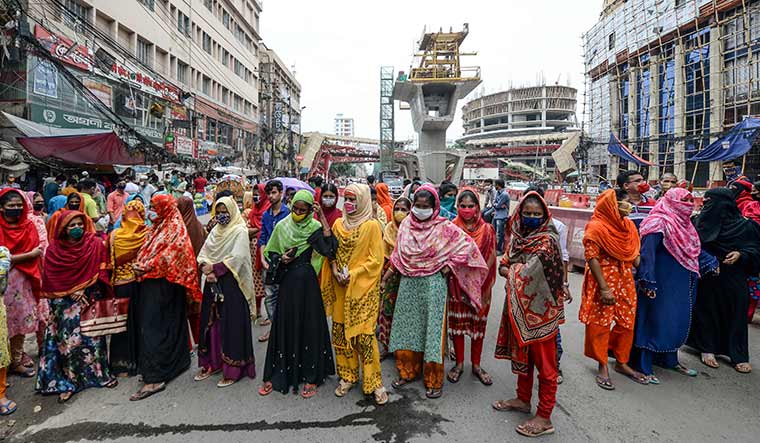IN MARCH, PRIME MINISTER Sheikh Hasina decided to scale down the yearlong centenary celebrations of the birth of Sheikh Mujibur Rahman, her father and Bangladesh’s jatir pita (father of the nation). The reason behind the decision was Covid-19.
World leaders who were to participate in a public meeting in Dhaka on March 17 pulled out because of outbreaks in their own countries. Four days before the event, as the number of Covid-19 cases surged in Delhi, Mumbai and Kerala, Prime Minister Narendra Modi called off his visit to Dhaka and sent a video message instead.
When Hasina decided to scale down the celebrations, only three Covid-19 cases had been reported in Bangladesh. A month later, there are more than 6,000 cases; 155 people have died. The country has been in lockdown since March 26, and it will remain so till May 5. A high-level committee headed by Hasina may decide to extend the lockdown.
The pandemic has already wreaked havoc on Bangladesh’s thriving manufacturing industry, which employs millions. With Ramadan having begun, the government is also bracing for a spike in the number of infections.
The authorities are struggling to prevent religious gatherings and enforce the lockdown. Last month, around 25,000 people assembled for prayers at a mosque in Raipur. On April 18, more than 10,000 people in Sarail violated the lockdown to attend the funeral of a well-known religious scholar who had died of unknown causes. The government said it had permitted only 50 people to attend the funeral.
“They violated the lockdown to send a message that they would not accept the government’s order,” Foreign Affairs Minister A.K.M. Abdul Momen told THE WEEK. “We will not accept such fanatic behaviour. Bangladesh is no longer a country of fundamentalists.”
Momen said violations would be strictly dealt with from now on. “We have closed down almost all mosques and asked everyone to offer prayers at home,” he said. “Any violation would be dealt with a firm hand.”
According to the government, Bangladesh has entered the third stage of the Covid-19 outbreak. “We have detected community-level infections,” said Momen. “But things have not gone out of control and we are not in a horrible situation. The government is taking tough actions, like controlling gatherings—religious and otherwise—everywhere in the country.”
More than 3,000 Bangladeshis have been stuck in India. A few hundred of them had taken part in the Tablighi Jamaat event in Delhi in March, which later became one of India’s largest Covid-19 clusters. Momen said many people had gone to India without informing the government of their intention to take part in the Jamaat event. “About 60 of them have been infected and they are quarantined in Delhi,” said Information Minister Muhammad Hasan Mahmud. “They can only come back if they are fit enough to come.”
Bangladesh is trying to arrange flights to bring back hundreds of citizens who had gone to Delhi and Chennai for health care purposes. “A number of tourists are stuck in Mumbai, Bengaluru and Rajasthan,” said Momen. “We will not be able to bring them back now. I am in touch with New Delhi and have learnt that they are being taken care of by the Indian government.”
Bangladesh is also trying to help struggling expatriates. Hundreds of Bangladeshis have died in outbreaks in the US and Europe, and many have lost their jobs. According to the foreign affairs ministry, 164 Bangladeshis have died in the US because of Covid-19. In the UK, around 150 have died. “We estimate that 28 lakh Bangladeshis settled abroad are now jobless,” said Momen. “We have decided to bring them back in a phased manner. They have every right to come back to their own country.”
The government has decided on a package worth Rs200 crore to bring the expatriates back. They will be given land and loans to start new ventures. A stimulus package worth Rs1 lakh crore has already been announced for the domestic market.
Bangladesh is one of the fastest growing economies in the world. Its labour-intensive growth and drastic improvements in health indicators had earned the praise of global experts. Covid-19, however, could have a lasting impact on the country’s future, since a major part of economic growth depends on exports of garments, food products and jute. According to Momen, garment companies have already lost export orders worth $2.5 billion, while remittances have fallen by 12 per cent.
There are, however, opportunities. Garment companies have started mass-producing personal protective equipment and sanitisers. Some companies have begun making test kits and ventilators, which Bangladesh is currently importing from China, Japan and East Asian countries. “This crisis has given us unbelievable opportunities for building up our internal capacity,” said Momen.
A big worry is the extent of community spread of the disease. At around 1,300 people per square kilometre, Bangladesh’s population density is one of the highest in the world. If community spread is not contained, the result could be disastrous.
Bangladesh, however, has learnt well from the outbreaks in Europe. “[Not separating Covid-19 patients from other patients] was the mistake that Italy did,” said Mahmud. “But we have been segregating Covid-19 patients from the start. In fact, we are building a good number of Covid-19 hospitals across Bangladesh.”
Mahmud said the government was worried about the eight lakh Rohingya refugees in Bangladesh. To prevent an outbreak, the authorities have decided to increase testing in cities like Cox’s Bazar, which have significant Rohingya population. “The Rohingya issue is a major headache for us,” said Mahmud. “There are reports of fresh infiltrations from Myanmar. We are trying to hold them back. More and more Rohingyas are coming to Bangladesh because the health care facilities in Myanmar are in distress.”



